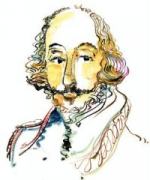|
This section contains 8,101 words (approx. 28 pages at 300 words per page) |

|
SOURCE: Cole, Susan Letzler. “‘Maimèd Rites’: Shakespeare's Hamlet.” In The Absent One: Mourning Ritual, Tragedy, and the Performance of Ambivalence, pp. 41-60. University Park: Pennsylvania State University Press, 1985.
In the following essay, Cole compares Hamlet to Xerxes, the protagonist of Aeschylus's The Persians, arguing that because Hamlet has been denied the catharsis of traditional funeral rites, he becomes obsessed with replacing his father rather than forging his own, separate identity.
All of the components which serve as links between funerary ritual and tragic drama are present in Shakespeare's Hamlet. There is not one deceased father but three (the elder Hamlet, the elder Fortinbras, and Polonius). A ghost appears outdoors, wearing armor, and indoors, apparently wearing a dressing gown. There is evidence of antithetical style (“With an auspicious and a dropping eye, / With mirth in funeral, and with dirge in marriage”1) and antiphonal exchange (Ophelia's “mad” songs of...
|
This section contains 8,101 words (approx. 28 pages at 300 words per page) |

|


